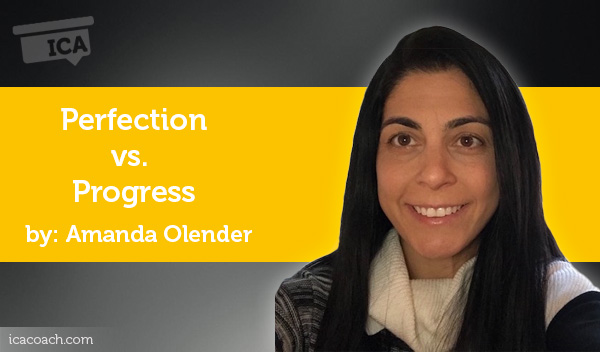
A Coaching Power Tool Created by Amanda Olender
(Life Coach, UNITED STATES)

I am not perfect, nor will I ever be. I am a work in progress, and that is definitely good enough. Anonymous
We live in a society where people are constantly striving for perfection. People want the perfect job, perfect marriage, perfect children, etc. These are ideals that will likely never get met. Too often, people become so focused on reaching “perfection”, that they lose sight of the progress they make along the way.
Perfectionism
Perfectionism involves a tendency to set standards that are so high they either cannot be met, or are only met with great difficulty. Perfectionists often feel stressed or disappointed with themselves for not being able to meet their standards. They believe they should never make mistakes and that making a mistake means they are a failure or a horrible person.
At the heart of perfectionism is fear. The fear of failure, the fear of making a mistake and the fear of being judged. For a perfectionist, these fears can be paralyzing and can play out as a continuous message that says “I’m not good enough”.
Often when we set new goals we start out excited and confident that things will go perfectly. However, as time goes on, people lose some of that excitement as challenges set in. When people face challenging times they too often give up and resign to the fact that their goal is not possible. Many may think that one desire for perfection may help them reach their goals, but in fact, it holds them back.
Here are some ways perfectionism stops people from achieving goals:
Progress
According to dictionary.com, progress is defined as “forward or onward movement toward a destination or goal”. Progress is about the journey and the learnings we make along the way. It is about improvement, not perfection. In the progressive mindset, we feel good about ourselves now, and even though we can acknowledge there is room for improvement, we appreciate ourselves at ever incremental step towards our goal. Progress is a simple and positive concept, yet most people have difficulty with it. Focusing on progress instead of perfection can make it much easier and enjoyable to reach your goals.
Here are some benefits of focusing on progress:
Progress vs. Perfection
Self Application
Realistic Thinking
One way to move out of perfectionism is to replace self-critical talk with realistic or helpful statements even if you do not believe them right away. Enough repetition will turn positive realistic thoughts into a habit.
Examples of positive realistic statements:
Taking a new perspective
Another approach in shifting from a mindset of perfection to progress is trying to see things from a different perspective. You can challenge your self-thoughts with questions such as:
Overcoming Procrastination
Procrastination is only a temporary solution and it tends to make anxiety worse over time. Here are some ways to help overcome procrastination and take action:
Coaching Application
As coaches, we need to be aware of our own perfectionist tendencies and how they may impact the coaching session as well as our ability to grow as a coach. If we focus on asking the perfect question, sharing the perfect observation and having the perfect session, we are not present with the client. We set ourselves up for constant feelings of disappointment and failure. If we focus on progress, we are learning, growing and most likely enjoying the coaching journey.
Perfection is the enemy of progress. Winston Churchill